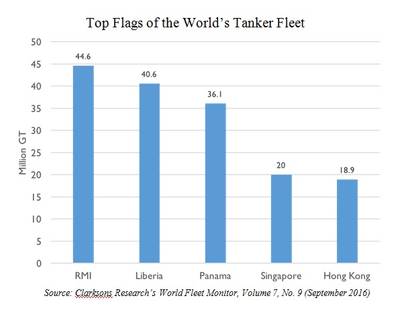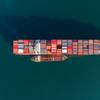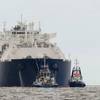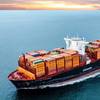The Republic of the Marshall Islands (RMI) Registry has attained status as the world's largest tanker fleet following the addition of tonnage from markets in Greece, the U.S. and Asia over the summer. The RMI flagged tanker fleet stands at 44.6 million gross tons (GT).
International Registries, Inc. and its affiliates (IRI), which provide administrative and technical support to the RMI Maritime and Corporate Registries, is committed to the continued decentralization of services to better support the Registry's owners and operators in every aspect of their business. This principle has led the RMI Registry to an average year-on-year growth of 15 percent since 2001.
Overall, the RMI Registry now stands at 137.3 million GT, with an average age of 8.7 years. The 3,937 vessels flying the RMI flag are afforded the excellent safety record of the flag that has been on the US Coast Guard's Qualship 21 program for 12 consecutive years and continues its status on the White Lists of the Paris and Tokyo Memorandums of Understanding.
“Qualship 21 is a particularly difficult standard to meet,” said Bill Gallagher, President, IRI. “As mentioned at the Connecticut Maritime Association's (CMA) Shipping 2016 Conference, 13 of the 26 eligible flag States from 2015 fell off Qualship. This dramatic development in the spring led directly to the increased tonnage for the Registry in the summer. The RMI is the only flag State of the three largest that holds Qualship 21 status; where others have faltered, we have remained steadfast for more than a decade.”
The RMI Registry credits much of its success to IRI's customer focused approach and excellent quality record.
“Tanker tonnage undergoes a strenuous vetting process and choosing a quality flag is one of the most important factors in the process for owners, operators, and charterers,” Gallagher said. “Through our exceptional operations and customer service to so many of the world's top shipping companies, the RMI Registry is in the business of running a high-quality and sustainable flag. We pride ourselves on our proactive approach to our shipowning customers, whether this means practical advice on ensuring that a ship meets port State control standards or addressing our owners and operators concerns in the development of international regulation, we provide a high level of support from any of our 27 worldwide offices.”
The RMI said it continues to be proactive at the International Maritime Organization (IMO) and in September established a dedicated team of experts to guide shipowners through the complications of complying with the recently ratified Ballast Water Management Convention. The move follows Finland's ratification of the Convention which means that more stringent ballast water management regulations will enter into force in September 2017. To comply, existing vessels will need to have installed a Convention Type Approved Ballast Water Management System (BWMS) by the first renewal of the vessel's International Oil Pollution Prevention (IOPP) Certificate.
The RMI Registry allows an early renewal of the IOPP Certificate before the entry into force of the Convention, which allows five years from the renewal date for BWMS installation. The RMI will be supporting proposals at the IMO's Marine Environment Protection Committee (MEPC) October meeting for a delay of BWMS installation on some existing vessels.
“We are committed to working with the industry to find practicable solutions to the Convention requirements,” Gallagher said.
“After making the difficult decision of choosing a flag, shipowners should enjoy peace of mind knowing that they have the full support of the RMI Registry,” he concluded.













